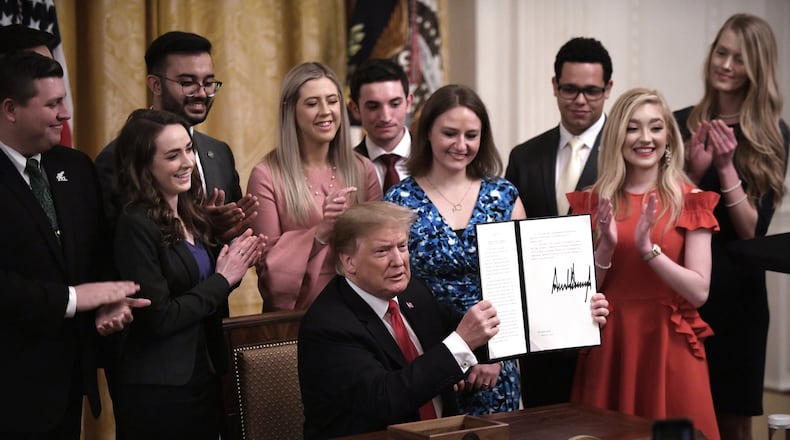President Donald Trump last month signed an executive order requiring colleges and universities follow their own guidelines on constitutionally protected free speech or lose federal research funds.
So how’s this going to work?
“It really depends on what (the Trump administration) decides to do to enforce this,” said Robert Shibley, executive director of the Foundation for Individual Rights in Education.
Shibley apologized for the answer, but he has a point. There are 12 federal agencies that could withhold funding, such as the National Science Foundation, NASA and the Defense Department. The executive order does not specify how these agencies will enforce the order. There are many uncertainties here.
Trump signed the order in response to complaints that some campus officials have illegally prevented students and guests from speaking or holding events on campuses, and in some cases students and others have physically attacked speakers. The Atlanta Journal-Constitution has reported in recent months about some Georgia schools reaching lawsuit settlements in cases involving claims that campus administrators violated guidelines when they prevented or limited where and when groups can express their viewpoints on campus. In many recent instances, those most concerned about campus speech restrictions have been political conservatives or from religious organizations.
Trump’s order is potentially serious stuff. The federal government awards an estimated $35 billion annually in research funding, Trump said. About $1 billion of those dollars comes to Georgia’s public and private colleges and universities.
Critics characterized Trump’s order as a wrongheaded action that could have unintended consequences on faculty conducting research who have no involvement in such actions. Supporters counter the order is necessary to combat free-expression restrictions they feel are often done by administrators with political bias against speakers and groups.
White House officials say federal agencies currently don’t certify that schools are following constitutional or their own campus-speech guidelines.
This will be a lot of work. There are more than 300 colleges and universities in Georgia.
Shibley said some federal agencies may actively enforce the order and others may overlook it. He’s concerned some administration officials may feel pressured to enforce the order.
“There are some pitfalls to be watched in this approach,” Shibley said.
A White House official said in a conference call with reporters before the president signed the order that “private universities will have to certify or — as a condition of receiving their aid, certify that they are following their intended policy. And public institutions have to follow the First Amendment.”
The White House Office of Management and Budget will work with each agency on implementation. They’ll have a lot of work to do.
About the Author
Keep Reading
The Latest
Featured



